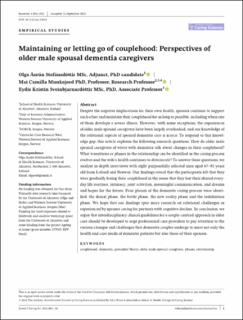| dc.contributor.author | Stefánsdóttir, Olga Ásrún | |
| dc.contributor.author | Munkejord, Mai Camilla | |
| dc.contributor.author | Sveinbjarnardóttir, Eydís Kristin | |
| dc.date.accessioned | 2021-11-02T09:03:55Z | |
| dc.date.available | 2021-11-02T09:03:55Z | |
| dc.date.created | 2021-10-01T08:38:38Z | |
| dc.date.issued | 2021 | |
| dc.identifier.citation | Scandinavian Journal of Caring Sciences. 2021, 1-10. | en_US |
| dc.identifier.issn | 0283-9318 | |
| dc.identifier.uri | https://hdl.handle.net/11250/2827178 | |
| dc.description.abstract | Despite the negative implications for their own health, spouses continue to support each other and maintain their couplehood for as long as possible, including when one of them develops a severe illness. However, with some exceptions, the experiences of older male spousal caregivers have been largely overlooked, and our knowledge of the relational aspects of spousal dementia care is scarce. To respond to this knowledge gap, this article explores the following research questions: How do older male spousal caregivers of wives with dementia talk about changes in their couplehood? What transitions or phases in the relationship can be identified as the caring process evolves and the wife's health continues to deteriorate? To answer these questions, we analyse in-depth interviews with eight purposefully selected men aged 67–92 years old from Iceland and Norway. Our findings reveal that the participants felt that they were gradually losing their couplehood in the sense that they lost their shared everyday life routines, intimacy, joint activities, meaningful communication, and dreams and hopes for the future. Four phases of the dementia caring process were identified: the denial phase, the battle phase, the new reality phase and the redefinition phase. We hope that our findings spur more research on relational challenges as experienced by spouses caring for partners with cognitive decline. In conclusion, we argue that interdisciplinary clinical guidelines for a couple-centred approach in elder care should be developed to urge professional care providers to pay attention to the various changes and challenges that dementia couples undergo to meet not only the health and care needs of dementia patients but also those of their spouses. | |
| dc.language.iso | eng | en_US |
| dc.rights | Navngivelse 4.0 Internasjonal | * |
| dc.rights.uri | http://creativecommons.org/licenses/by/4.0/deed.no | * |
| dc.title | Maintaining or letting go of couplehood: Perspectives of older male spousal dementia caregivers | en_US |
| dc.type | Peer reviewed | en_US |
| dc.type | Journal article | en_US |
| dc.rights.holder | Copyright © 2021, Authors | |
| dc.description.version | publishedVersion | |
| dc.description.version | publishedVersion | |
| cristin.ispublished | true | |
| cristin.fulltext | original | |
| cristin.fulltext | original | |
| cristin.qualitycode | 1 | |
| dc.identifier.doi | 10.1111/scs.13035 | |
| dc.identifier.cristin | 1941838 | |
| dc.source.journal | Scandinavian Journal of Caring Sciences | en_US |
| dc.source.pagenumber | 1-10 | en_US |
| dc.relation.project | Norges forskningsråd: 188928 | |
| dc.relation.project | Norges forskningsråd: 287301 | |

